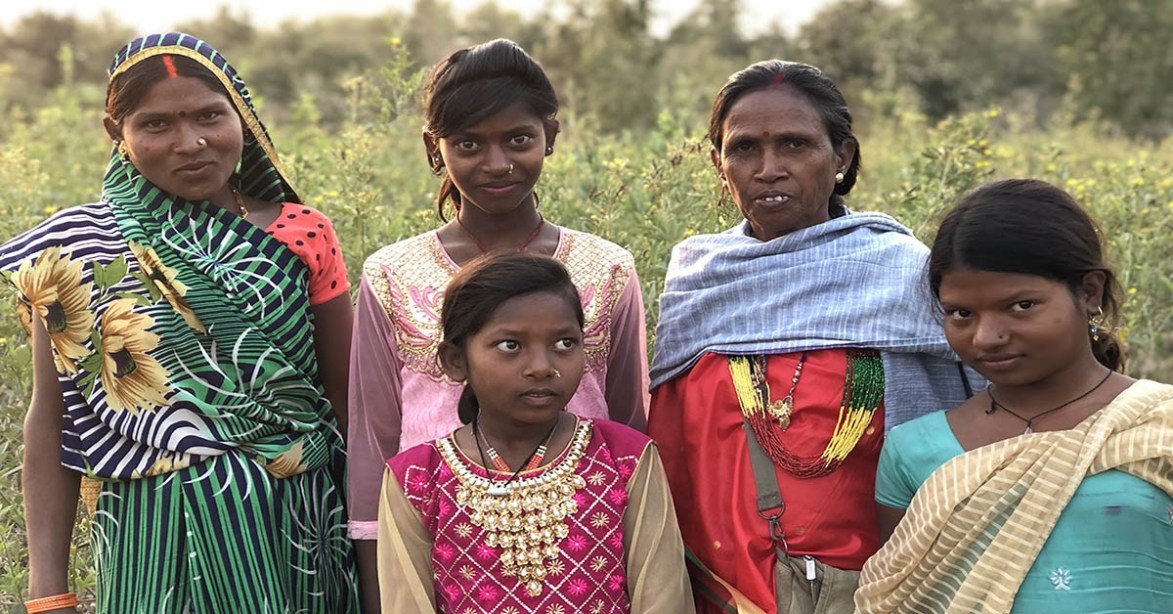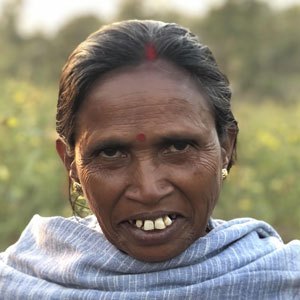
Last year, when forest rights leaders Sokalo Gond, Nandu Gond and Kismatiya were illegally arrested from Chopan station in a clandestine manner, news travelled to the interior areas, too. Rajkumari, a resident of Sukhda tola [hamlet] in Dhuma village, near Dudhi in Uttar Pradesh, had to flee. She did not want to spend another several months in prison again.
The sudden arrests that took place in June in Sonbhadra were a backlash against the community land claims filed by several thousand Adivasis in March, 2018 under the leadership of women leaders from the community, Sokalo, Rajkumari and Shobha.
Rajkumari has played a huge role in empowering women leaders from her community. She travels far and wide in order to educate people about their rights on their lands.

Rajkumari Bhuiya
Rajkumari is from the Bhuiya community, residing in states such as Odisha, Bihar, Uttar Pradesh (UP), Madhya Pradesh (MP) etc. Bhuiya literally translates into the Hindi word Bhumi meaning land. Adivasis comprise about 70% of the population of Sonbhadra. The prominent tribes residing in the area are-Gond, Karwar, Pannika, Bhuiyan, Baiga, Cheron, Ghasiya, Dharkaar, and Dhaunar. Most Adivasis residing in the villages are dependent on the forests for their livelihood. They often collect Tendu leaves, honey, dry branches and medicinal herbs from the forests and sell them in the market. Some of them also have small farms, on which they grow rice or different vegetables. Many Adivasis living in the region have been denied their lands and rights because of Sections 4 and 20 of the Indian Forest Act, 1927 – a colonial era legislation to regulate the movement and transit of forest produce. Many Adivasis have also been implicated in false cases under this Act.
Most of the Adivasis are landless. In 2015, after protests against the Kanhar irrigation project, in which several people were fatally injured by the bullets of the PAC personnel, several false cases were foisted on the protesters. If the Kanhar dam comes into existence, it is expected to displace as many as 11 villages.
Here, you can hear a song in Rajkumari’s voice:
“When I went to jail, I was alone for many days. I felt sad and low. I had not committed any crime. But then I realised that it was not for myself, it was for the whole country, it was for everyone who was involved in the struggle for forest rights. It was to save our forest lands from vested interests. That gave me hope and strength.”
Rajkumari was lodged in Mirzapur prison, where the living conditions were abysmal. “You know, Didi, there was a stench of urine all over the place. Thankfully, my cell wasn’t next to the toilet. I thought to myself, how will I live here? I thought, nobody is coming!” she continues. “I wasn’t even allowed to drink water when I was arrested. In jail, we got a plate, a lota [mug], a blanket, a bowl, and a mat. We would make our own food. We would clean the jail. Our drinking water was dirty. The jail has a capacity of only 30 women but sometimes, there would be almost 90. There was a lot fighting between the jailed women [over space, food, soap, blankets]. Sometimes, the jailors would make us sleep in the bathroom because there was no space.”
A few months later, Sokalo and AIUFWP general secretary, Roma, too, were sent to the jail, all on trumped up charges. “I thought I won’t come out of the jail until this Kanhar dam is constructed.” Rajkumari spent over four months in jail. After being released from jail, Rajkumari continued to lead the struggle for forest rights in the Sonbhadra region.
The experience of the prison and the hardships strengthened her resolve to keep fighting for her community and other forest dwelling people who were exploited.
Not that hardships were new to her. Rajkumari was married off at a young age, a practice which was followed then. She worked at others’ fields and houses and earned Mahua in return. “Some of my brothers died. As superstition prevailed, some people told my mother that if I got married, there would be no more deaths. Hence, I was married off early,” she says. It took many years for her to get used to the idea of marriage. Both she and her husband, Mulchand Bhuiya, worked on farms and earned meagre amounts of money. “I gave birth to a daughter, she died at the age of five.” After this incident, her husband turned to alcohol and told her that he didn’t want to stay with her. She had to return to her parental house and remained estranged for about three years. When her parents started talking about remarrying her, her husband came to take her back.
The small built woman human rights defender (HRD), Rajkumari was later trained as a Gram Sakhi and would move around, telling people the importance of getting educated. Around this time, she also suffered from a tumour in her uterus, which festered for three years in the absence of appropriate diagnosis and health advice. She says she bled day and night. “I thought I was going to die.” She didn’t have the money for the treatment and took a loan. She had to mortgage the small piece of land that she and her husband owned.
It was then that she joined the union, now known as the All India Union for Forest Working People (AIUFWP), and has been with the union ever since. In 2005, Rajkumari and Mulchand, along with many other families, reclaimed land in Dhuma – which had been taken over by the forest department – as their own original land. A year later, while continuing to cultivate on the old plot, they built a new house on the reclaimed land. It was a challenge to unionize people in the region, since they faced extreme oppression and deprivation. “We had to hold meetings in hideouts”, she recalls. She feels that being with the union has enriched her, and continues on the journey to educate and claim what belongs to her community. “I don’t care about my life, what we are fighting for is more important and we will continue doing that,” says Rajkumari, even as the threat of ‘eviction’ looms large over the forest dwelling communities.
You can watch Rajkumari singing as she travels from village to village as a part of her human rights related work here:




